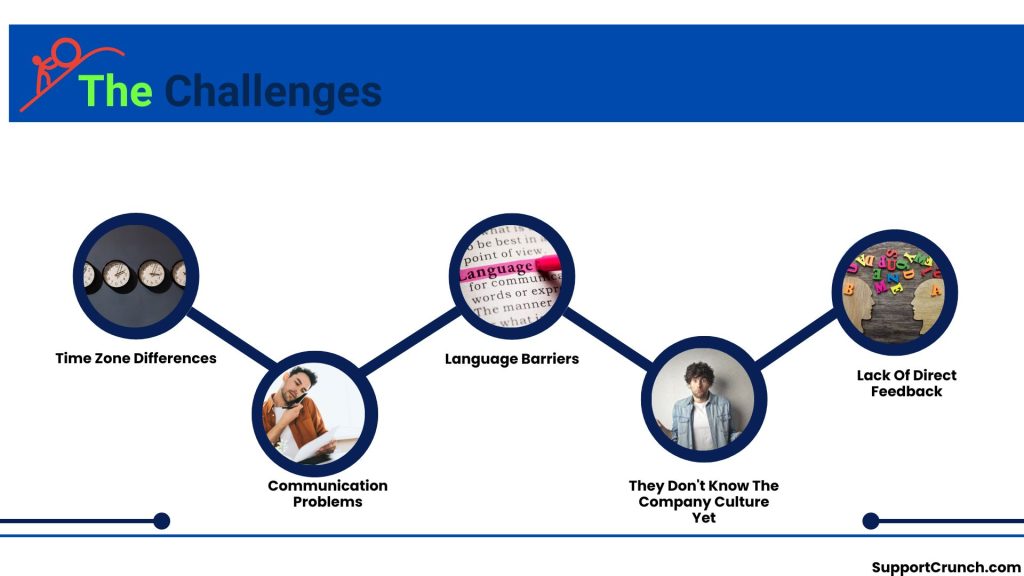If you’re thinking about to hire remote developers, congratulations! You’ve come to the right place. At SupportCrunch, we will not only guide you on how to hire remote developers. But at SupportCrunch, you can find professional developers to do your projects without flaws.
One of the most significant benefits of hiring a remote developer is that they can work from anywhere in the world. So if you have an office on the other side of the country or another continent, that’s no problem.
Hiring remote workers can be a great way to expand your business and get access to people who may not live close by. However, it does require some pre-planning and thoughtfulness. Before starting the hiring process, you’ll need to ensure you have the right tools, technology, hiring process, and screening process.
Here SupportCrunch will guide you on how to hire remote developers that will be perfect for filling the crunch of your IT sector.
How To Hire Remote Developers | SupportCrunch Procedure

Step 1: Don’t Just Hire Remote Developers, Hire Good Ones
When it comes to hiring, you want to ensure that you hire the right person for the job. You don’t want to hire someone because they are available or cheap. When hiring remote developers, first consider what skills your project requires and then find a candidate.
Find someone willing to learn new technologies and has enough experience to do their job well without needing direct supervision from a project manager 24/7.
The same goes for local developers: finding someone who lives near your office may seem like an easy way out (we’re all busy people), but it’s important not to hire on proximity alone if a local developer is not able to perform their duties effectively.
Then having them nearby won’t help much at all. Having them nearby could cause more problems than it solves since there will be less communication between team members due to geographical distance.
Step 2: Thoroughly Prepare a Job Description and Post It Where Your Ideal Candidates Hang Out
Before you start looking for candidates:
- Prepare a job description that accurately details the requirements of your position.
- Include a title, salary range, and links to your company website, culture page, and social media profiles (where applicable).
- Include a link where applicants can submit their cover letters and resumes.
Once you’ve posted this information on your site and other remote development communities like SupportCrunch, GitHub Jobs, or Stack Overflow Careers, it’s time to identify potential candidates.
Step 3: Use a Candidate Screening Process
The best remote developers are in high demand, and there’s no shortage of job seekers looking to work remotely. So your next step is to filter out candidates who don’t meet your hiring standards.
You can use an interview process to screen out bad candidates. The more complicated part is finding which questions will screen out good and great ones. Come up with a list of questions to help you identify the best person for the job, regardless of where they live or how much experience they have.
Please keep it simple: Start by asking questions about their previous work experience and then move on to their technical skills and desired compensation package.
Step 4: Conduct Interviews, In The Same Way, You Would For On-Site Employees
You should conduct interviews in the same way you would for on-site employees: ask questions that are relevant to your needs, such as what they consider their strengths and weaknesses; how they approach problems; and what skills they hope to develop in the future.
These interviews aim to get a sense of who this person is and whether they have the potential to be a good fit for your team.
Evaluating candidates over video calls is also essential because you can only judge so much from simply reading resumes or portfolios. It’s an opportunity for you both to assess each other’s personalities, communication skills, and cultural fit—all things that can make or break your working relationship down the road.
Step 5: Incorporate Team Members Who Are Working Remotely Into The Screening Process
If hiring a remote developer, you must include your team members in the screening process.
Depending on the location of your team members and where the applicant lives, make sure everyone is available at the same time for an interview. If not, schedule a time for them to talk on Skype or FaceTime.
Have each member meet with the candidate face-to-face and review their work samples. The interviews should be conducted over video chat so that both of you can see each other while talking—it also allows them to hear how they communicate verbally while reviewing their portfolios and resumes.
Step 6: You Might Have To Be Flexible About Working Hours If You’re Hiring In Other Time Zones
You might have to be flexible about working hours if hiring in other time zones. Some remote workers are okay with communicating during the work day, but others prefer not to get messages on their phones or laptops during certain hours.
If you want to hire someone far from you, you must agree on how often and when they’ll get in touch with you.
If this concerns you, remember that most freelancers can pick up the phone and call their clients whenever they want (or vice versa). So don’t let this be a deal breaker.
Step 7: Make Sure Your New Remote developer has the tools they need to do the job well.
You’ll need to do a little research to ensure your new remote developer has the tools they need to do the job well.
Make sure your new remote developer has a good internet connection. You might want to reconsider the hire if they don’t have one.
Make sure the remote developer has a good computer. If it’s old, outdated, and slow, it will be hard for them to do their job well.
You should look into what kind of software they’re used to using. They must have access to the same programs you have access to so they can easily collaborate with you and other team members.
Then, make sure that if there are any special software requirements for their position (like a specific code editor), you make sure those are available for them as well.
Finally, make sure that their workspace is set up in such a way that they can be productive without any hassle.
Need To Source And Hire Remote Developers?
Find perfect match at SupportCrunch
The Primary Challenges of Hiring Remote Developers

Hiring remote developers is an exciting and intriguing prospect. You can find new talent from all over the world and hire people with skills ideally suited to your project. The problem is that these people are not always as easy to work with as you might like. Here are some of the primary challenges you may face when it comes to hiring remote developers:
- Time Zone Differences: When working with a remote developer, it’s essential to understand their time zone so you know when they will be available to communicate with each other. This can make it hard to schedule meetings or collaborate on projects.
- Language Barriers: Some countries have different languages than others, which can pose a challenge if your team doesn’t speak the same language as their clients or coworkers. Everyone on your team must understand what everyone else is saying so there aren’t any misunderstandings or confusion about what needs to be done next.
- Communication Problems: Even though we live in an increasingly digital world where most people rely on email for communication rather than phone calls or other methods (like snail mail), there’s still no substitute for face-to-face conversation. If you have a team that works together in the same physical space, they can see each other’s faces and body language to get an idea of what’s happening. That’s not possible if they’re working remotely.
- Lack Of Direct Feedback: The lack of direct feedback from clients or end users about whether or not something is working for them. This cannot be easy because people often don’t know exactly what they want until they’ve seen it implemented successfully.
- They Don’t Know The Company Culture Yet. Remote employees won’t necessarily know how things run at your company yet, so you’ll need to make sure they understand what’s expected of them and when (and how) so there aren’t any misunderstandings later on down the line when it comes time for them to start contributing more heavily towards projects or taking on more significant responsibilities within the company as a whole.
Reasons To Hire Remote Developers

When it comes to hiring developers, there are many factors to consider. These include where you want your developers to be, their experience and how much they can contribute to the team. However, one thing often overlooked when building your development team is that you don’t have to hire local developers.
This is especially true if your company has a global reach or if you want access to a larger pool of talent from around the world. In this section, we will explore some of the benefits associated with hiring remote developers for your project:
They Are Cheaper Than Local Developers
Remote developers are cheaper than local developers. It is a common misconception that remote developers are more expensive than local developers. The opposite is true. Remote developers can be up to 20% cheaper than local developers.
The people who work for you don’t need to be in the same office. They can live anywhere in the world and do their job just as well as someone sitting next to them. This means they’re not only able to do more work for less money, but they’re also able to stay up-to-date on technology trends and innovations.
In addition to working remotely, remote developers can be more flexible with their schedules and often have fewer responsibilities outside of work (i.e., family commitments). This means your company can hire more people when it needs them without worrying about finding an office space big enough for everyone.
You Can Hire More Experienced Developers
Hiring a remote developer may be an option if you’re a small business owner. You can hire more experienced developers remotely. So you don’t have to spend time and money on training them.
The only downside is that they won’t be able to attend meetings in person and will need to communicate via video chat or email. Additionally, this strategy allows you to implement new features at a faster pace because your employees don’t need to commute to work every day.
Hiring more experienced developers is a good idea for two reasons:
- They will be able to hit the ground running and be productive from day one because they’ve already been through the process of building a product before, so they know what to expect and how to do it.
- They have a better understanding of your business, which means they can deliver faster and with higher quality than less experienced developers would be able to do.
They’re Easier To Work With Since They Work Remotely
You’ll find it easier to work with remote developers since they won’t be in the office. They can work from anywhere, so you don’t have to worry about them being late or taking too many breaks.
If a remote developer is sick, they can still get their work done as long as they have an internet connection. And if you need someone who can work during off-hours, like at night or on weekends, they will be able to do that too.
You Don’t Have To Own a Large Office Space To Accommodate All Of Them
You can work without worrying about workplace logistics when you hire remote developers. Instead of renting out office space or paying for a lease that may never be used, you can hire the developer and get down to business. You don’t have to stress finding the right location (or getting stuck in traffic).
You also don’t need to worry about any overhead costs associated with hiring local workers or managing office space. This means there are no hidden fees when it comes to payroll or taxes—which frees up more funds for other projects.
It Is Easier To Set Up Your Development Team
It’s easier to set up your development team remotely. There are several reasons for this.
First, remote teams can work from anywhere as long as there is internet access. This makes it easy to find the best location for your team, whether in a central location or spread out across several different cities and countries.
Second, remote teams are more flexible than traditional teams because they don’t have to be in one place at one time; instead, they can work on projects whenever they have time available—whether that’s during the day or late at night—and they don’t need to worry about missing meetings because they’re not physically present in person.
No Impact of Pandemic Like Coronavirus
Another reason to hire remote developers is that there is no impact of a pandemic like a coronavirus on your work.
A pandemic like a coronavirus has been a massive problem for organizations and businesses. Many companies have suffered heavy losses due to this virus. However, organizations with remote developers have not been affected by the coronavirus pandemic as much as other companies.
This is because they do not require the physical presence of their employees, and they can work from anywhere in the world.
You Can Tap Into a Larger Talent Pool
By hiring remote developers, you can tap into a larger talent pool. With the growing demand for software developers and the shortage of qualified candidates, companies are often forced to hire from a smaller talent pool.
This means that you may miss out on valuable candidates who live outside your local area. Hiring remote developers can expand your reach and find more qualified candidates willing to relocate or work remotely.
Time Zones Don’t Matter When Working With Remote Teams
If your business is global, you might have to work around the clock to meet deadlines and get projects done. Remote developers can do this because they are not bound by the same time restrictions as their colleagues who work in an office.
You may also be looking for someone who can work in a different time zone than your team, which is another reason hiring a remote developer could benefit your business.
Remote Workers Are More Dedicated and Productive
Remote workers are more dedicated and productive than their colleagues who are cooped up in an office environment.
When you hire someone to work remotely, you’re getting someone more invested in the project. They don’t have distractions like coworkers and managers hanging around them all day. They can focus on their work without worrying about what everyone else is doing or where they should spend their time.
Remote workers have a greater sense of ownership over their projects because they don’t feel like they’re just another cog in a machine—they know that you chose them specifically for this job, and it’s essential to both of you.
This sense of importance allows remote workers to give 110% every day instead of just putting in enough effort so no one will notice when they slack off (like some office drones).
As far as productivity goes? It’s simple: when people aren’t distracted by other people, they get more done.
Need To Source And Hire Remote Developers?
Find perfect match at SupportCrunch
8 Places To Find and Hire Remote Developers

It’s no secret that hiring can be a challenge for any company. But for companies with remote workers, hiring can be especially tricky. The best way to find and hire great developers is to know where they’re hanging out online—and then jump in with both feet.
SupportCrunch
SupportCrunch is a platform where you can hire professional developers to work on your projects. We have a pool of talented developers who can help you with any software or web development project.
We have PHP, Java, Python, and Ruby on Rails developers ready to help you with your project. Our developers are experienced in developing web applications using the latest technologies like Java 8, Spring Boot, React JS, and Angular JS. They also have experience with building mobile applications using iOS and Android SDKs.
Our developers have expertise in various programming languages like Python, Javascript (NodeJS), Ruby, PHP and C#, etc. We also provide support for managing servers, databases, and frameworks like Symfony2/3 and Laravel 5/6.
You can also visit our website for more information about their services and prices.
LinkedIn is a great place to find remote developers. You can filter by location, skill set, and years of experience or search for developers who are already interested in remote work. You’ll also find groups of freelancers looking to partner up with others—these people may be able to help with your project if they’re interested!
Remote.co
Remote. co is the best place to start if you want to hire a remote developer.
This site has many great features that make finding and hiring the right people easy. You can post a job listing in just a few minutes, and it’s free! They have many developers on their site, so there are plenty of options for you, no matter what project you’re looking for.
Their search engine will help narrow down your options based on skill level, location, and more so that only relevant candidates appear in your search results. Another cool feature is their community page, where developers can connect, ask questions or leave feedback about potential employers who might be hiring them soon.
So if someone says something bad about their experience working with an employer, other people won’t waste their time applying there either!
StackOverflow
If you want to find and hire remote developers, StackOverflow is a great place to start. Many developers are looking for remote work on the platform, and most already know the technologies you’re looking for. That means they can hit the ground running if they join your team.
Upwork (formerly odesk)
Upwork is a site where you can hire and find remote developers, software engineers, and designers. Its talent pool is massive, easy to use, and has a good reputation. There are also a lot of reviews for both clients and freelancers, so you can get an idea of how people feel about their experience working with Upwork.
WeWorkRemotely
WeWorkRemotely is a website that connects companies with remote developers. It’s an excellent place to find developers willing to work with your company and can work on the type of project you need. They have a lot of developers on their platform, so you shouldn’t have any problem finding someone suitable for what you need to be done.
Jobspresso
If you’re looking for a platform to help you find your next remote developer, Jobspresso is an excellent option. Jobspresso uses AI and data science to help companies recruit the best candidates and find developers who are right for their specific needs. The platform has three steps:
- Upload your job description with the skills required
- Answer questions about the project and what makes it unique from other projects in your pipeline
- Get matched with top developers
Vettery (for those who get lucky)
Vettery is a platform that allows you to hire from a curated list of developers. If you’re looking for someone with the same skill set as your current team, Vettery can help you find them and hire them in as little as two weeks.
Conclusion
So there you have it! Hiring remote developers is not only possible but also a viable option for many projects. The key is to be prepared, know what questions to ask and how to ask them, and understand what kinds of people you’re looking for.
Also, keep in mind that remote work can mean different things for different people, so if you need help deciding whether or not this option will work well for your project (or if you want professional developers), feel free to reach out! We love hearing from our clients and would be happy to advise on anything related to hiring remotely.
